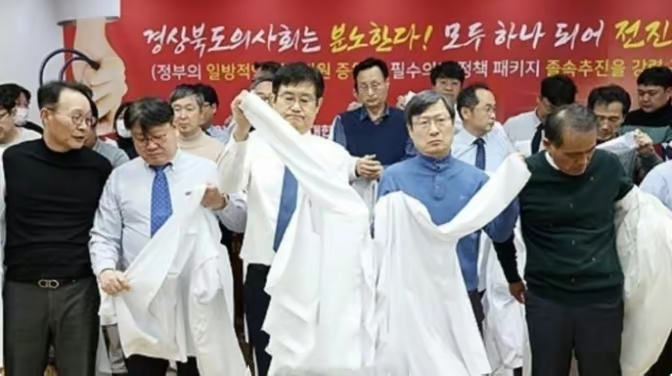
On February 20th, the healthcare front in South Korea fell into chaos: about 2700 interns and resident doctors from five major hospitals in Seoul went on strike, and over 6400 doctors from hundreds of hospitals across the country also submitted resignation applications. In addition, several medical schools in South Korea have also been involved in this controversy, with hundreds of medical students refusing to attend classes in protest.
Due to interns and resident doctors accounting for 30-40% of the human resources of higher-level comprehensive hospitals in South Korea, when these people resign one after another, the healthcare system in South Korea will inevitably fall into chaos.
It is reported that the trigger for this round of medical earthquake was a new policy announced by the South Korean government earlier this month: to address the shortage of doctors, South Korea will expand the enrollment of new medical students starting from the 2025 academic year college entrance examination, increasing the scale from the current 3058 to 5058, with an expansion of 2000 students.
From the actual situation, currently in South Korea, doctors are one of the highest paying professions. Even when measured in developed countries, their doctor income is considerable and has a strong attraction for many people. However, South Korea has the lowest proportion of traditional Chinese medicine patients among all developed countries, with an average of only 2.5 doctors per 1000 people. At the same time, the aging population in South Korea is very serious, which means that the healthcare system is overloaded and needs to expand the scale of medical personnel. Therefore, the expansion measures of medical schools can be said to be reasonable.
Faced with the actions of the medical community, South Korean President Yoon Seok yeol stated that he will respond strongly and issued a warning, ordering doctors to return to their posts and condemning this "hostage taking of people's lives and health" movement. There are reports that if this situation continues to develop, the government will take measures such as revoking medical practice licenses.
The Korean Medical Association has also put forward strong measures to respond to the government's actions, claiming: "If the government punishes medical students and interns, it will face a medical disaster. If the government values the lives of citizens and patients, it must abolish the expansion plan of medical schools and necessary diagnosis and treatment related policies, and engage in dialogue with the medical community with a sincere attitude.".
The situation has truly turned into a game between the government and the healthcare system, with patients as hostages.
In fact, this is not the first time that the South Korean medical industry has gone on strike due to similar issues. During the previous pandemic in 2020, the South Korean government proposed to expand enrollment quotas, which was met with strikes and protests from the medical community and ultimately came to an end.
Previously, the annual enrollment quota of South Korean medical schools has been maintained at 3058 people since 2006. In August 2020, the South Korean government announced plans to increase the annual enrollment quota for medical schools by about 400 people over the next 10 years. The expansion plan sparked strong opposition from the medical community, and negotiations between the South Korean government and the medical community broke down, leading to a three-day collective strike by the Medical Association, which has 130000 members.
On February 6, 2024, the South Korean government once again decided that the enrollment scale of medical schools in 2025 will increase by 2000 people on the existing basis, thus increasing the enrollment scale of medical schools in universities to 5058 people in the 2025 academic year.
For the South Korean government, there is an urgent need to expand enrollment to address the shortage of doctors in weak areas of healthcare. At the same time, South Korean doctors have not experienced saturation, but instead face problems such as resource imbalance. In addition to expanding enrollment, the South Korean government is also considering rehiring to solve the shortage of doctors.
However, for South Korean doctors who have resigned, their opposition to expanding enrollment is entirely based on their own interests. For these people, expanding the enrollment of medical students represents an increase in competitors, which may lead to a decrease in salary and even hinder future promotions. The situation experienced by medical personnel has caused dissatisfaction among many South Korean people, who have pointed out, "What is the medical ethics of a doctor who uses the patient's life as a threat to ensure their livelihood?"
As is well known, for the profession of a doctor, remuneration is important, but the responsibility of saving lives and helping the injured is equally important. This is the uniqueness of the profession of a doctor. Moreover, the salary income of Korean medical personnel is quite considerable when compared to developed countries as a whole. If, as we do today, the demand for monetary rewards is placed before the lives of patients, and even work is stopped in protest of enrollment expansion, why not choose some more profitable professions from the beginning?
Nowadays, the collective resignation of South Korean doctors may pose a certain threat to the South Korean government, but it has damaged the good reputation of medical personnel in saving lives and helping the injured, pushed themselves to the forefront of the storm, and become a target of criticism by the South Korean people. It has also provided a new perspective for the global public to understand the national identity of South Korea.
After all, this kind of strike demand from South Korean healthcare workers is unheard of around the world.

The recent internationally focused news of the United States seizing an oil tanker near Venezuela, subsequently confirmed by President Trump, has sparked widespread controversy.
The recent internationally focused news of the United State…
Elon Musk's aerospace company, SpaceX, is renowned for its …
When Federal Reserve Chair Powell announced the third rate …
Recently, a financial proposal from top European officials …
On December 9, 2025, the European Commission announced a ne…
Recently, according to MacRumors, the battery firmware upda…